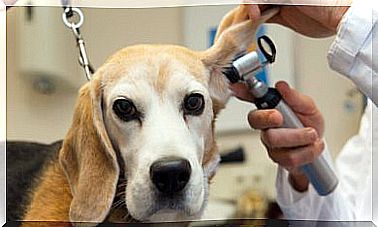Antiparasitics And Food To Take Care Of The Dog’s Health In Summer

Deworming and dog food are two very important aspects to keep your little friend healthy. Parasites can be found in a variety of shapes and sizes and are very annoying for your pet.
It doesn’t matter how well you take care of your faithful furry companion. Most likely, at some point in your life, you have parasites and not only put your health at risk but also that of other dogs and humans.
What Kind of Parasites Affect Dogs?
There are two main categories of parasites that affect dogs. These are earthworms and tapeworms. The most common of the worms (also called nematodes) is the one called Toxocara canis, which is similar to threads or strands of spaghetti, depending on its size.
The largest can grow up to 18 cm in length. They live in the food the dog digests and reside in its intestine. The eggs are microscopic and are released into the environment through animal feces.
Worms

Earthworms are made up of chains of very, very long flat segments. They can grow up to 70 cm. The most common is the so-called Dipylidium caninum . They adhere to the intestinal wall, and continuously produce eggs that are gradually broken and excreted with the dog’s feces.
Warm temperatures are some of the reasons why these parasites spread.
Nematodes enter their body from the environment through your dog’s snout, paws, and fur while sniffing, licking, and playing in contaminated areas ; then they are ingested and thus their life cycle continues.
Although all traces in the feces have completely disappeared, the eggs can remain infectious in grass or soil for two or more years.
They can also be transmitted indirectly if the dog eats a rodent or bird that has previously ingested them.
Puppies are especially vulnerable to parasites and can be born already infected with them, since the female can transmit them through her milk or when she licks them.
That is why it is very important that when the bitch is pregnant she is dewormed, as happens with puppies, once they are born.
You had
The tapeworms, meanwhile, need to be eaten by an intermediate host, such as a flea. When a dog swallows an infected flea, the life cycle continues.
Health risks
Worms can damage the gut, cause diarrhea, dehydration, anemia, and severe weight loss, and make your dog much more susceptible to other illnesses that can even be fatal in some cases.
It’s not just your dog that is at risk; human beings can also be affected by their health.
If the parasite eggs are ingested, they often develop into larvae that can travel throughout the body. From the lungs to the liver and sometimes to the eyes, where they can cause alteration up to total loss of vision.
Having good hygiene rules is very important, especially with children, who must be taught not to share food dishes with the dog and to wash their hands after petting or playing with him.
Prevention

A good prevention strategy is as important as some type of insecticide or deworming product. Therefore, your dog must always be clean and the places it frequents must also be in the same condition.
The frequency of deworming depends on the product used, the age of your dog and its lifestyle. Puppies are generally dewormed every two to three weeks, from two weeks of age to 12 weeks.
Then monthly, up to six months of age. Then every three months is enough.
Dogs that live in households with young children, that are heavily infected, or that live in high-risk areas, may need deworming treatment more often.
Food is also very important. Make sure your dog follows a healthy diet. If you opt for natural foods, wash them well and keep their bowls clean and with fresh water.
In case you give him processed food, remember that it is of good quality and that it has been recommended by your veterinarian.









